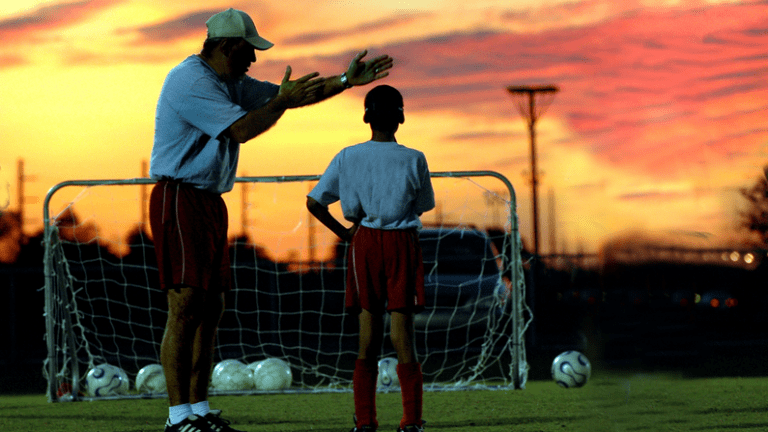If you are dialed in to the American soccer scene in even the slightest way, you have heard all of the craze over 18-year old Christian Pulisic. The Borussia Dortmund youngster has displayed a level of technical ability and creativity unmatched in our nation. Whether he is beating players with the dribble to create space for himself or chipping in a pass over the top of Honduran defenders perfectly into the run of Clint Dempsey for a goal, there is no denying that he is a special player.
This leads me to my next point. Is creativity developed on its own in an individual or are there outside factors playing a role? For the sake of this article, let’s focus on the things that you, as a parent, can control.
1. Stop giving instructions in the moment.
If you’ve been to a youth soccer game, chances are you’ve heard phrases such as “Kick it!” or “Pass!”. While most parents have good intentions and are only trying to encourage their children, the negative impact that this can have on a young player’s soccer experience is massive. Sure, giving instructions to the players may seem harmless, but instead, you are impeding on their opportunity to make decisions on their own and solve problems.
Children are significantly more intelligent than we would like to give them credit for. As an example, picture yourself playing tag with a four year old. In the seconds leading up to your approach, that same four year old will survey their options, make a decision on where to go, attempt to wait for the right moment, and eventually execute. Using that same process, players need to learn to make and execute decisions on their own. Shouting “kick it!” as loud as you can cuts that process short and creates robots rather than fosters creativity and imagination.
Building off of the lack of credit we give children for their devision-making ability, they very frequently fix mistakes quicker than the most accomplished adults do. If you have ever been a part of the youth soccer scene, you have witnessed a player, regardless of the level, that is far superior to the competition. This player seems to beat opposing players with ease using pure speed or the simplest of moves. Why does he or she continue to revert back to the same routine to get to success? Let’s go back to that game of tag. After getting fooled twice by the same decision, you actually tag the child. What are the chances that child makes the same decision a third time? I would say slim to none. Why? Kids learn faster than we think from their mistakes, and more importantly, their successes. The old motto of “If it ain’t broke, don’t fix it” pertains to soccer as well.
2. Stay away from incentivizing performance.
This easily could have been number one, and for reasons not involving developing high-caliber players at all. Nearly 75% of kids drop out of soccer by age 13. As you can imagine, many of them no longer find the game fun due to pressure from a coach or parent, falling out with friends, or countless other external factors. While everyone wants to see their kid succeed, it is important to keep in mind how we define success.
We have all heard stories of parents offering money or others types of incentive for goals, assists, shutouts or anything trackable based on performance. Now let me put this straight: Nothing beats the innocent joy of a child scoring a goal, making a save, or completing any other task that we would define as success. However, incentivizing these types of things can be harmful to not only your child’s development but the others around him. By now, you probably think I’m crazy, but just think about all of the other skills and lessons that can be missed if your kid has that five bucks that you promised at the forefront of the mind. If faced with the chance to shoot or make a pass to create a better opportunity, which one do you think they would take? Like most of us, they are going to shoot.
3. Get them playing!
It’s no secret that this generation has plenty more distractions at their disposal than in the past. With technology growing rapidly, we have everything at our fingertips and can gather information in a moment’s notice. Kids experiencing play outside on a daily basis is hard to come by given everything else that they have access to at such a young age, but with that said, getting them playing can be the simplest and most beneficial way to foster creativity in your youngster.
You don’t have to believe me. Take if from Johan Cruyff, world football legend, who once said, “Everything for me started in the street. The area where I lived was nicknamed the ‘Concrete Village’, an experiment in building cheap housing after the First World War. It was working class, and as kids we spent as much time out of the house as possible; from as early as I can remember we played football everywhere we could. It was here I learned to think about how to turn a disadvantage into an advantage.”
Aside from the actual experience gained from playing the game, the creativity necessary to create boundaries and goals without all of the proper equipment is being put to waste if they are enabled to sit behind a television or cell phone for long periods of time. Playing, experiencing competition, solving problems, learning from mistakes, and building skill along with game understanding all come along with playing the games. It is truly amazing what a child can learn with a ball at his or her feet.
By no means is this a step-by-step guide to turn your child into the next Christian Pulisic, but it is however some useful tips to play a helpful role in your little soccer-lover’s development. While a coach’s knowledge is crucial and should be expected, an informed parent means not only more skill, but more life lessons picked up along the way.
How useful was this post?
Click on a star to rate it!
Average rating 0 / 5. Vote count: 0
No votes so far! Be the first to rate this post.



